|
|
|
Sort Order |
|
|
|
Items / Page
|
|
|
|
|
|
|
| Srl | Item |
| 1 |
ID:
148270
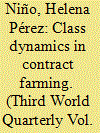

|
|
|
|
|
| Summary/Abstract |
This paper examines the class relations emerging in a contract farming scheme in Mozambique. Debates in the literature about contract farming characterise this market arrangement as leading to farmers losing control over production at the hands of capital. By discussing both the drivers and impacts of changes in the division of property and labour, this paper reveals a complex class structure in which the pressure of merchant capital on farmers is internalized within households and transferred onto workers and sharecroppers. This challenges the pertinence of conventional policy that prescribes empowering contract farmers without considering their varied class positions and interests.
|
|
|
|
|
|
|
|
|
|
|
|
|
|
|
|
| 2 |
ID:
148268
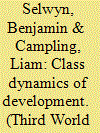

|
|
|
|
|
| Summary/Abstract |
This article argues that class relations are constitutive of development processes and central to understanding inequality within and between countries. Class is conceived as arising out of exploitative social relations of production, but is formulated through and expressed by multiple determinations. The article illustrates and explains the diversity of forms of class relations, and the ways in which they interplay with other social relations of dominance and subordination, such as gender and ethnicity. This is part of a wider project to revitalise class analysis in the study of development problems and experiences.
|
|
|
|
|
|
|
|
|
|
|
|
|
|
|
|
| 3 |
ID:
148274
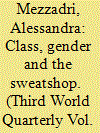

|
|
|
|
|
| Summary/Abstract |
Drawing on approaches to class emphasising the multiplicity of labour relations at work under capitalism, and from feminist insights on oppression and social reproduction, this paper illustrates the interconnection between processes of class formation and patriarchal norms in globalised production circuits. The analysis emphasises the nexus between the commodification and exploitation of women’s labour, and how it structures gendered wage differentials, labour control and the high ‘disposability’ of women’s work. The analysis develops these arguments by exploring the case of the Indian garment industry and its gendered sweatshop regime. It illustrates how commodification and exploitation interplay in factory and home-based realms, and discusses how an approach on class premised on social reproduction changes the social perimeters of what we understand as labour ‘unfreedom’ and labour struggles.
|
|
|
|
|
|
|
|
|
|
|
|
|
|
|
|
| 4 |
ID:
148276
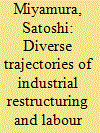

|
|
|
|
|
| Summary/Abstract |
It is often claimed that industrial restructuring leads to diminished roles for trade unionism and other forms of labour organisations by informalising employment and relocating production. Drawing on selected case studies from long-term fieldwork in regions of India, this article shows that trajectories of industrial restructuring and the responses by organised labour over the past two decades have been diverse. It is argued that the diverse response not only reflects structural opportunities and constraints for labour to be organised in particular ways, but also different histories and experiences of labour association. Contrary to the presumption about the general demise of trade unionism and the apparent unattainability of class solidarity in contemporary globalised capitalism, it is observed that India’s labour movement is experiencing a degree of resurgence, and new forms of labour organisations and activism are emerging, especially involving informal workers in the formal sector. That these innovative forms of mobilisation are shaped by experiences and aspirations that do not conform to the established institutionalised frameworks for dispute resolution has important policy and political implications.
|
|
|
|
|
|
|
|
|
|
|
|
|
|
|
|
| 5 |
ID:
148273
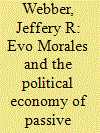

|
|
|
|
|
| Summary/Abstract |
While the government of Evo Morales rules in the name of indigenous workers and peasants, in fact the country’s political economy has since 2006 witnessed the on-going subjugation of these classes. If the logic of large capital persists, it is legitimated in and through petty indigenous capitalists. This article argues that Antonio Gramsci’s conceptualisation of passive revolution offers a superior analytical point of departure for understanding contemporary Bolivian politics than does Álvaro García Linera’s more widely accepted theory of creative tensions. However, the dominant manner in which passive revolution has been employed in contemporary Latin American debates has treated the socio-political and the ideological as relatively autonomous from the process of capital accumulation. What is necessary, instead, is a sharper appreciation of the base/superstructure metaphor as expressing a dialectical unity of internal relations between ‘the economic’ and ‘the political’, thus avoiding one determinism or another. Through a reading of Gramsci that emphasises such unity, this article interrogates the dynamics of ‘extractive distribution’, class contradictions of the ‘plural economy’, and transformations in the urban labour market which have characterised Bolivia’s passive revolution under Evo Morales between 2006 and 2015.
|
|
|
|
|
|
|
|
|
|
|
|
|
|
|
|
| 6 |
ID:
148269
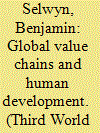

|
|
|
|
|
| Summary/Abstract |
Global Value Chain (GVC) proponents argue that regional and human development can be achieved through ‘strategic coupling’ with transnational corporations. This argument is misleading for two reasons. First, GVC abstracts firm–firm and firm–state relations from their class-relational basis, obscuring fundamental developmental processes. Second, much GVC analysis promotes linear conceptions of development. This article provides a class-relational framework for GVC analysis. The formation and functioning of GVCs and the developmental effects associated with them are products of histories of evolving, and often conflictive, class relations. A study of export fruiticulture in Northeast Brazil provides empirical support for these arguments.
|
|
|
|
|
|
|
|
|
|
|
|
|
|
|
|
| 7 |
ID:
148272
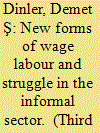

|
|
|
|
|
| Summary/Abstract |
In the absence of formal employment opportunities and with increasing urban and rural poverty, the informal recycling sector has become a means of survival for the past two decades in Turkey. In the capital city, Ankara, the large majority of waste pickers constitute former dispossessed Kurdish farmers who migrated to the city with their families from the southeastern regions as a result of forced migration, and seasonal Kurdish workers who alternate between rural and urban employment. The introduction of new waste management regulations in 2004 made the recycling market a significant area of struggle between local authorities, recycling companies and waste pickers. Local authorities have used these regulations to force waste pickers to sell their waste to certain recycling companies at a price lower than the market price. Waste pickers have reclaimed their right to work in the streets against the violence executed by the municipal police. This paper investigates the ways in which waste pickers should be considered wage labourers and what kind of a moral discourse they have used in making their demands vis-à-vis local governments during the process of intense conflict and negotiation.
|
|
|
|
|
|
|
|
|
|
|
|
|
|
|
|
| 8 |
ID:
148275


|
|
|
|
|
| Summary/Abstract |
This article examines how Koreans became industrial workers in the first and second phases of industrialisation on the peninsula: under Japanese colonial rule, 1931–45 and under the DPRK’s post-Korean War heavy industrialisation, 1953–60. While the political regimes of the Japanese colony and postcolonial DPRK were different, industrialisation occurred under similar conditions, characterised principally by war, state capitalism and imperialism. Processes of proletarianisation also reveal similarities in the two periods, including the widespread use of forced mobilisation and immobilisation of workers, and a bureaucratic apparatus supporting close control of labour. The article contributes to the critique of conventional views about the role of ‘free wage labour’ during the transition to capitalism.
|
|
|
|
|
|
|
|
|
|
|
|
|
|
|
|
| 9 |
ID:
148271
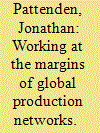

|
|
|
|
|
| Summary/Abstract |
This article analyses why informal labourers working ‘at the margins’ of global production networks lack ‘structural’ and ‘associational’ power. It does so in order to better understand potential changes in their material and political conditions, and as part of broader calls to put labour at the centre of development studies. The article focuses on rural-based labourers in south India who work relatively invisibly as agricultural labourers and informal factory workers, and on the construction sites of a ‘global city’ (Bangalore). It deploys a three-way labour control regime framework that encompasses (1) the macro-labour control regime, which is ultimately defined by capitalist relations of production, and characterised in India by particularly high levels of informality (precarious and largely unregulated work) and segmentation (due to the fragmentary impact of caste); (2) the local labour control regime, which refers to how class relations in specific places are shaped by patterns of accumulation and work (themselves shaped by differences in agro-ecology, irrigation, and remoteness from non-agricultural labour markets), distributions of classes and castes, and the uneven presence of the state; and (3) the labour process, which is increasingly marked by forms of ‘remote control’ marshalled by labour intermediaries. Debate on the macro-labour control regime and on the labour process is well established, but little has been said about local labour control regimes, which are newly defined here and discussed in terms of differences between ‘wetland/circulation zones’ and ‘dryland/commuting zones’. The article identifies locations where labour has greater potential structural and associational power. Increased worker organisation in these areas could have knock-on effects in more ‘obscure’ sites.
|
|
|
|
|
|
|
|
|
|
|
|
|
|
|
|
|
|
|
|
|